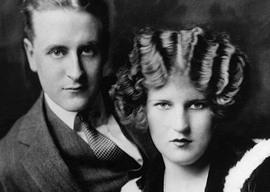
October 13, 2010

Francis Scott Key Fitzgerald and Zelda Sayre Fitzgerald
NEW YORK—My first copy of The Great Gatsby cost me $2. It was 1953, the cover was dark blue with city lights in the background and a pair of mournful green eyes looking at nothing in particular. I had just finished Tender is the Night, so I took Gatsby home in exhilaration, not unlike going home with the girl of your dreams—well, almost. I was not to be disappointed. Although I never related to Jay Gatsby the way I did to Tender’s Dick Diver, he reminded me of a couple of men I had met in my 15 years of life. But Dick was someone tragic, which I aspired to be—Tender was the most glamorous of novels. Gatsby was lyrical as well as brutal, and like all Scott’s novels it was magical, mystical, and full of romance. Here’s the narrator Nick Carraway: “There was something gorgeous about him, some heightened sensitivity to the promises of life….It was an extraordinary gift for hope, a romantic readiness such as I have never found in any other person and it is not likely I shall ever find again.”
The story of Jay Gatsby who came mysteriously to West Egg, of his sumptuous entertainments, and of his obsessive love for Daisy Buchanan is well known. Three films have been made. The second, with Alan Ladd playing Gatsby, is by far the best. The last and most expensive one had a ludicrously miscast Robert Redford trying to play a cool Jay and an ever-so-flighty Mia Farrow as Daisy. During the movie’s planning, producer Robert Evans told me they were trying to get Truman Capote to write the screenplay. I knew Evans from way back, when his name was Shapiro. He is still with us and he’s OK, if very Hollywood. (His late brother Charles was a friend.) I mentioned to him that I’d heard rumors about Capote’s drug-taking and inability to deliver. “Well, who do you think we should get—you?” Evans asked dismissively.
Francis Ford Coppola wrote it and, very surprisingly for such a good writer, he messed it up. Looking cool and calling everyone a “sport” was not what Gatsby was about, nor was the hero symbolized by having a hell of a lot of new shirts and beautiful clothes. That was Shapiro’s view, or rather, Evans’s.
Many have called The Great Gatsby the best American novel ever written. Something to do with the way it’s structured. I don’t know how one measures such things, but good books to me are like beautiful women; you can’t compare them. I loved Gatsby and have read it two or three times. Tender I have read more than five. (A Moveable Feast almost annually.) When people ask me why I refuse to expand my horizons, I answer the same way Paul Newman once did about women: “Why eat hamburgers out when you have steak at home?”
Fitzgerald obviously based all his heroines on Zelda; this apparition was the love of his life as well as his ruin. Here’s Ring Lardner, a great writer of the 1920s, sending Zelda a rhyme he wrote while sitting across her at a dinner table: